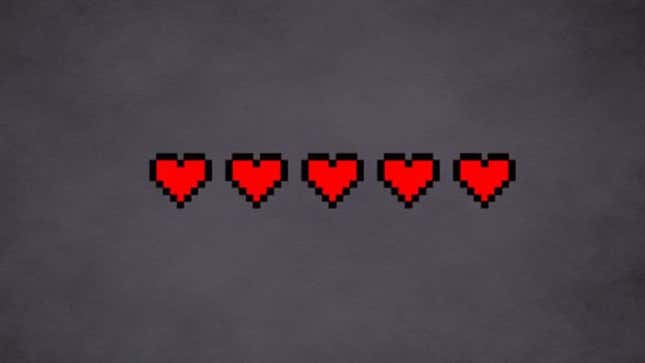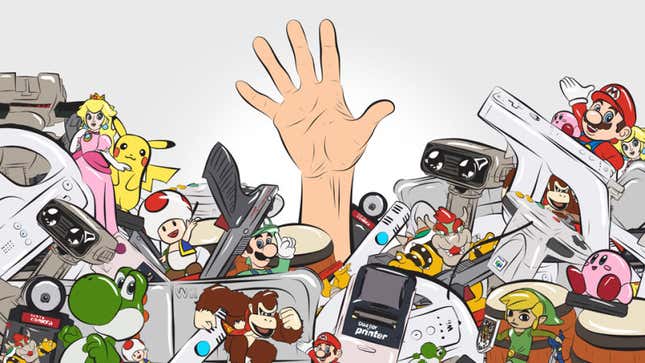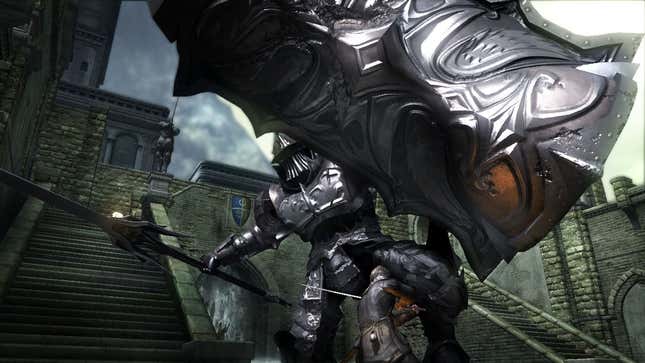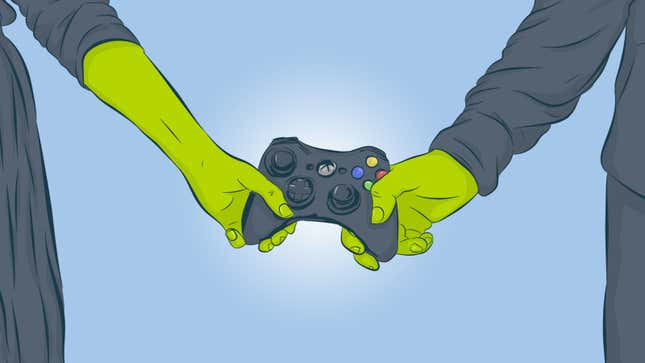
In the first years of my career as a games writer, I got used to a certain reaction from my parents’ friends when they were told about what I was doing for a living. It was usually along the lines of “what a waste”. I imagined them shaking their heads as if they’d just been quietly informed that I was shooting heroin. I was a smart kid, gregarious, academically inclined. Why would I devote myself to these violent, mindless things?
This post originally appeared 10/31/16 on Kotaku UK.
I sometimes wonder whether my passion for video games is mostly attributable to these people; whether my love for gaming was strengthened, or even forged, in the fires of their disapproval. Most of us nurture an inner contrarian, and especially when we’re teenagers: a time of life when I wholeheartedly embraced every cliche of rebellion you can imagine. This was also the time when I decided to pursue a career in the thing that was supposedly ruining my young mind.
Games have been a part of my life since I was seven and my parents (grudgingly) acceded to my insistent requests for a Super Nintendo Entertainment System at Christmas. I was sixteen when I quit my posh school in Edinburgh to launch into this ridiculous, terribly-paid career - after work experience at a long-dead scrappy publisher in Bournemouth, my first step was as a staff writer on a video games magazine. Since then games have had an even more defining effect on my life: they have been work and play. Thinking back on moments in my life and my career brings to mind not only what was happening in the real world, but also what was happening in games: what I was playing, what was newly released, what new rumour or scandal was making its way around in whispers. I have lived my life alongside games. I have grown with them.

What makes this relationship particularly complicated is that games themselves have also done a lot of growing in the time I’ve been alive, and they still have a lot of growing left to do. When I was a child, according to the people around me, games were for children. The stereotype evolved; as a teenager, games were for spotty socially-awkward teenagers and/or sociopaths. But I have always seen meaning and beauty and joy in games, and my determination to show that meaning and beauty and joy to those people - people who didn’t understand games, who saw them as at best meaningless and at worst potentially dangerous - was a driving force behind my choice of career.
So was that adolescent desire to rebel. As a teenager it was deeply satisfying to be doing something that older people found incomprehensible. But I’m not fourteen anymore, and I’m no longer driven by a perverse desire to flip-off nebulous authority figures. I’m a grown woman who still loves video games, and is no longer surrounded by people who think they’re sick or stupid. There has to be more to it.
My aunt is grinning sideways at me over Easter dinner, near the head of a table crowded with complex extended family. “It’s all just bleep bloop, bleep bloop,” she says, extending her arms at right angles like a toy robot in imitation of a digital character. People laugh. I am silently furious, feeling myself turn crimson. Earlier that day, I’d shown her The Elder Scrolls IV: Oblivion, taking it as an example of what modern video games were about and hoping that it might dispel some of her preconceptions about them. I’d climbed up onto the roof of my house in Skingrad and shown her the sunset.
I’d been playing Oblivion in first-person. There isn’t even a digital character on the screen.
Another time, years later. How many times, I wonder, am I going to have to answer this same question? Am I going to be doing this for another decade?
The reporter I’m talking to is not particularly positively disposed towards video games, or to me. He’s covering the launch of a popular game, one of the few that make traditional media suddenly notice that they exist and come looking to people like me for an explanation of why on earth anybody cares about them: Grand Theft Auto V. Having already gone through the usual barrage of mildly patronising questions - are these things really bigger than films? What’s the point of them? Aren’t they all horribly violent and damaging to children? Are you telling me women play them now? - he starts asking me why any sane adult would bother.
I try to explain, but I know it’s pointless. “When I talk to people like you, I do often think ‘why don’t you read a book’,” he interrupts, halfway through my answer. I tell him I did my Master’s in comparative literature. That shuts him up.
I sometimes - occasionally - feel like video games really are as worthless and depressing as everybody else seemed to think when I was growing up. To be a person who loves video games is often to be frustrated with them. Why do they fall back on predictable, pointless violence so often? Why do they so seldom even try to say anything worthwhile, as opposed to just being mildly entertaining for an acceptable 15 hours? Why, even when they engage with interesting periods of human history, are they usually more concerned with finding stuff to blow up than anything human to tackle? Often it feels like games are wilfully, purposefully stupid. Play them for longer than a decade or so and you start to feel like Neo, seeing the code behind the facade. They become predictable, and when they become predictable they become boring.
This feeling always passes. It passes because I play something worthwhile. Sometimes it’s something that changes my idea of what a game can do. Sometimes it’s just extremely good fun.
I don’t exclusively love artistically worthy games; surely no-one does. I love childish video games, fantastical ones, violent ones, silly ones. I love Monster Hunter, which asks me to slay gigantic, majestic creatures and make hats out of them. I love Halo, a preposterous space-opera with laser guns and zealot aliens. I love Grand Theft Autoand I love LIMBO. I love Dark Souls, intimately and with as much passion as I have ever loved any work of art. I love jumping a little man in a red hat around relentlessly inventive, abstract environments. Sometimes, jumping a little man around is as close to sublime as video games get.

Late at night in the summer, I’m playing Mario Galaxy 2, enjoying the way Mario responds to my thoughts and intentions as if there’s no controller between me and the game. I turn him on his heel, cartwheel, wall-jump and vault around, exploring its toylike levels by his touch. There isn’t much in the world that’s as aesthetically perfect as a good Mario level. They please the mind, for me, in the same way as abstract sculpture.
I’ve been playing 3D Mario games since I was seven. They are second nature. When I was a kid, Mario’s movements felt as natural as my own. Just existing in the levels is a pleasure, walking and jumping around the tactile innards of Tick Tock Clock, admiring how its interlocking cogs and wooden parts guide and challenge the player. To me, they are examples of flawless game design.
Mario blasts off to a new galaxy, and the initial flourish of music triggers something dormant in my memory. After a few seconds I realise I’m walking around in a perfect recreation of one of Super Mario 64’s first worlds, Whomp Fortress. I laugh out loud in delight.
“The way I see it, every time someone plays a game, they are dosing themselves with dopamine... When it comes to dopamine, anything that becomes predictable has less and less of an effect. This causes us to get bored fairly quickly with the games we play and always want something better. Unless the game is designed to change and keep challenging us, or it contains a dynamic social element, it quickly becomes stale.
Game developers generally view their customers as either ‘hardcore’ or ‘casual’. I would like to urge developers to abandon this world view and replace it with a perception of gamers as ‘high dose’, ‘medium dose’, and ‘low dose’. If you can do this, the relationship between developers and their customers becomes a lot less confusing... Once companies start following an approach of ‘cradle to grave’ customer capture based on the dosing model, keeping customers and monetising them gets a lot easier.”
-Neuroscientist and video game consultant Ramin Shokriz on “Dopamine Driven Design”, Gamasutra.
Games, especially now, are sometimes designed to be seriously manipulative. Free-to-play games specifically created to suck players into a gambling-like compulsion loop and part them with their cash are the symbolic bogeyman, and they inspire an instinctive distrust in those of us who’ve been playing a long time, but I wonder whether such nakedly greedy business practices are only exposing something that was always there in video games. They’ve always been designed to give us an illusory feeling of accomplishment, to envelop the mind with their fabricated rules.
There’s a well-known psychology experiment called the Skinner Box. Rats, given a random reward for pressing on a lever, will become obsessive, pressing the lever over and over again until a reward is dispensed. Some game designers use these principles to encourage players to pleasure-chase their way through hundreds of pounds of microtransactions or 1000 points’ worth of Achievements, turning people into rats pushing the game’s reward lever. Some games - like Destiny - are faintly terrifying in their mastery of our brain’s reward chemicals, hooking us in with a combination of second-to-second sensory feedback and a longer reward loop that hooks itself deep within the brain.

I hate the idea of these reward loops and compulsion circuits. I am not playing a slot machine, I am playing a video game. I am a person, with an active mind, not a rat pressing a lever for a drop of sugar water. We are not rats in cages. Right?
There’s no denying games have a chemical effect on the brain. When I’m playing rhythm-action games - Amplitude, particularly, or Rez - I fall into a kind of trance in which the game’s signals, its visual cues and thudding music, travel directly to my reflexes without interference from my brain. Other people can induce this state using vertical shooters or fighting games or arcade classics. People often call it The Zone, or flow. It is intensely pleasurable.
Games in these genres do a lot to trigger those chemicals in the mind. Their visual language - contracting and expanding abstract shapes, patterns of dots - mimic the brain’s own visualiser, what you see when you’re on the brink of sleep or listening to music with your eyes closed or stoned or high. Combine that with the dopamine that triggers when you match the game’s patterns perfectly and it’s a powerful rush. I’ve spent hundreds of hours playing rhythm games to the point of mastery, chasing that feeling.
Other people get it from shooters, or Tetris. Maybe some people get it from any game at all.
I wonder occasionally whether I developed some kind of mild chemical addiction to video games as a child that I’m still chasing as an adult. And whether the search for a new reward really does push me towards the kind of games that I play.
Tower Knight is a total bastard. Twenty feet tall, hefting an axe that probably weighs as much as the Eiffel Tower, he exists to guard the entranceway to the inner keep of an ancient, dilapidated castle that I obviously want to get into. Whenever I enter his tower I am stomped out of existence under his gigantic metal boots after a brave few seconds of hacking at his shins. This has happened many, many times, and I see no way past his ridiculous two-foot-thick shield and chinkless armour. He is impassive, and impassable.
As I know now, there are some pretty easy ways to get past Tower Knight. I could hide in the battlements and snipe him with arrows or magic, if I had a magical catalyst or a bow. I could go away to some other place and come back when I am not so pathetically under-levelled and under-equipped for the fight. I don’t know this yet, because I have not read the Demon’s Souls wiki to learn from other adventurers’ experience. I am too proud. This game will soon knock that out of me.

It’s the middle of the night, I’m in a Japanese dorm room. I’ve been trying to kill the bastard Tower Knight for hours and have long since lost count of the attempts. I walk up to the fogged doorway that marks his domain, stretch a chainmail-clad arm through it and run straight up to the battlements to dispatch the archers that snipe from above. Back on the ground I go straight for Tower Knight’s ankles as always, dodging that first mighty swing of his axe, but this time I am suddenly possessed by superhuman skill. He stomps, I roll away. He turns toward me, I dart through his legs. I stab and swipe at his ankles until a gush of blackish liquid suddenly spurts from between his armour and he begins - slowly, but inevitably - to crash to the castle courtyard, a tremendous clatter of metal on ancient stone. I sprint for his head and strike it over and over until he begins to haul himself to his feet, unsteady, faltering.
The second time Tower Knight crashes to the ground is the last time. I’ve taken blows in the meantime and I’m one hit away from death. I hack desperately at his head, hoping with my heart in my mouth that he’s near death himself (the game doesn’t tell me), and just as he’s starting to get up he falls back, limp, a gigantic empty suit of armour lying still in the silent courtyard.
The controller slips from my shaking hands and I leap up with a great surge of adrenaline, yelling at nothing. I am incomparably exhilarated, flooded with ecstasy. The game had thrown everything it had at me and I’d won. I’d overcome the game and myself; for a moment there, it was like the impossible became possible. It felt like I’d broken the laws of physics. Almost every boss in Demon’s Souls and Dark Soulsfeels like this. It’s why those games enjoy such a devoted following.
My Japanese apartment-mate knocks on the door and opens it, an expression of concern on her face. “Daijoubu?” she asks, evidently roused by my involuntary shrieking. “Are you OK?” I laugh in a weird, high-pitched way, conscious that my hands are still trembling. “I’m great! I’m great,” I reply. She withdraws, looking more puzzled than concerned.
Many of the games that really lodge in the memory are ones that make you work hard for your fun. Pokémon is an incredibly complicated, time-intensive and demanding game that has proven hugely more popular with children, including my miniature self, than hundreds of patronisingly unchallenging games that supposedly cater to kids.Demon’s Souls and Dark Souls are so thrilling because they don’t offer up success on a plate. Games that require an investment - of time, of mental energy, of understanding - are the ones that bind themselves to us permanently, rather than the ones that entertain us for a weekend.
There’s an element of self-improvement to this, I suspect; we get a kick out of getting better at things. It’s the same kick you get out of doing well at an exam. All humans like to do well. We are aspirational creatures.
Humans are curious creatures, too. We love to solve problems and to explore, and like novels, the best video games give us incredible places to mentally inhabit. Some of them are ways to explore the inside of a person’s mind. Most of them, though, are less intimate; an interesting inevitability in an artform where the final result is usually the products of many pairs of hands, rather than one.
For a long time there was this hope that games would get to the point where they’d be as good as films at portraying human emotion. Much of the games industry laboured in service of this ambition for the greater part of the 00's. That obsession with aping cinema held games back, in my mind, from finding their own language. But in the past five years or so it’s become clear that they don’t need to look to cinema any more to find their inspiration and aspirations. Games have their own good writing now, and their own ways of getting under your skin. They don’t need to be validated by association any more. They don’t need to try to be films.
I’m not going to make a list of games that have made me cry, as if that’s the gold standard for empathy. I cry at almost anything, so it’d be an unusually long list. But they can make me cry. When I was growing up that seemed like a far-off ambition. Nowadays it’s just reality. Playing games for the story - for the human connection you might make with its characters or its themes or its origins - is no longer a preposterous notion. It’s not even that rare. It’s part of what games now do.

The second time I played through Journey, I did so with my mother. She didn’t have her hands on the controller; she sat with me, on the sofa, on a cold evening, and watched as I pursued that mountain.
My mother, of all the older people who have ever been sceptical about my love of video games, is the one that I have been most determined to win over. She had her reservations when I moved away from home at sixteen to work on a games magazine, but she says that it was when she was clearing out the cupboards in my room - stuffed to bursting with the memorabilia of my Nintendo childhood, torn-out magazine pages, fan art sketches, notebooks full of ideas - that she realised that what I was doing was something I’d always wanted to do, and resolved to support me in it. She remained unconvinced by the games themselves, however, and every few years I have sat her down in front of something that I hoped she might enjoy - something that, by extension, might help to change her mind.
In 2006, it was Shadow of the Colossus. In 2015, it was Everybody’s Gone to the Rapture. In 2012, it was Journey.
Neither my mother nor I are strangers to loss. Winding our way up that mountain with an anonymous helper, the inevitability of what was about to happen became almost too much to bear. Neither of us spoke for a long while as we took those final few steps, and watched the ending play out. It was worse the second time around. I turned to my mother with streaks of tears down my face, expecting to catch her crying too, but instead she looked composed: composed, but distantly, deeply, reflectively sad.
“This is video games, now,” I said.
“This is life,” she said.
Games are many things, and we play them for many reasons. I play them for many reasons. Some games I play for edification, some for the brain-chemical high, some for fun, for self-betterment, to travel through a world of someone else’s creation, to feel something.
Playing video games is, for me, part of a lifelong rejection of boredom. It’s an expression of some intrinsic wanderlust. It’s an affinity for the transgressional, the new, the experimental. Games are many things. They’re not the most meaningful things in my life - it’d be nonsense to claim that games have impacted me as much as things like travel, human intimacy, or creative endeavor. But to me they are more varied and unusual and, yes, meaningful than anything else in home entertainment, anything that isn’t Real Life. That’s why they’ve held my attention, for all these years. That’s why I play.

This post originally appeared on Kotaku UK, bringing you original reporting, game culture and humour with a U from the British isles. Follow them on @Kotaku_UK.